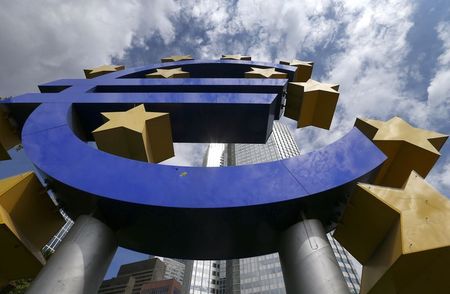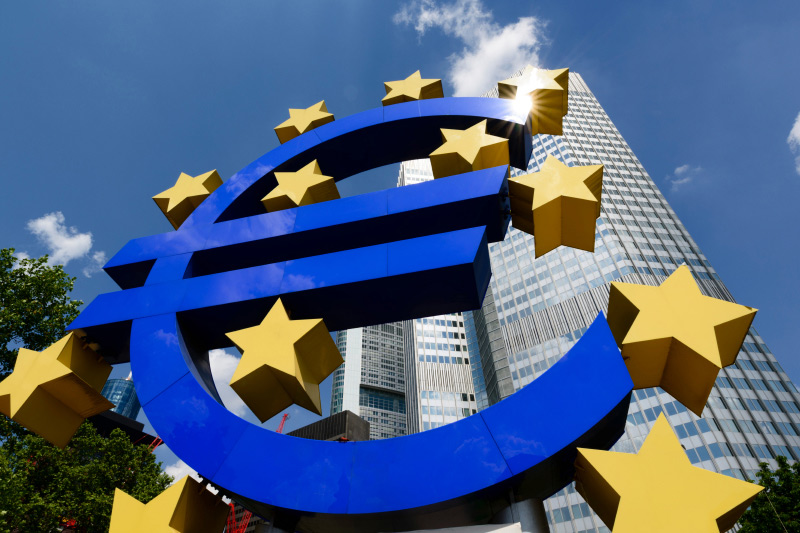By Eva Taylor and John O'Donnell
FRANKFURT (Reuters) - The European Central Bank signalled on Thursday it stands ready to print money and buy bonds if the euro zone slides towards deflation and warned the conflict in Ukraine poses a serious risk to the bloc's economy.
Speaking after the ECB held borrowing costs at record lows, its president Mario Draghi gave a frank assessment of the difficulties facing the 18 countries that use the euro - not least tit-for-tat sanctions between Russia and the Europe.
"There is no doubt if you look at the world today that the geopolitical risks have increased," he said, highlighting the uncertainty created by the situation in eastern Ukraine, where pro-Russian rebels are battling the Kiev government.
"Some of them, like the situation in Ukraine and Russia will have a greater impact on the euro area than they ... have on other parts of the world," Draghi said.
Having cut interest rates in June, the euro zone's central bank kept them steady as it waits to see whether September's new round of funding for banks and other schemes will help spur economic activity and avert the threat of falling prices.
Euro zone inflation fell to 0.4 percent in July, its lowest for four years and well below the ECB's near 2 percent target.
Draghi said he expected banks to take up to 850 billion euros of the ultra-cheap four-year loans, which will be tied to lending to smaller companies, the bloc's economic backbone.
Acknowledging that the economic recovery was "weak, fragile and uneven", Draghi also gave an important signal that he would be ready to go further by printing money to buy assets such as government bonds, known as quantitative easing or QE.
He said he would not be discouraged by the fact that the United States was taking a different course, paring back its QE programme as it prepares to raise interest rates next year.
"Monetary policies in Europe and in the United States and the UK are going to stay divergent, are on diverging paths and are going to stay on diverging paths for a long time," he said.
The decision to hold borrowing rates - taken by the ECB's Governing Council - had been expected by economists.
Many are now shifting their attention to next year to see whether the ECB will launch asset purchases.
Draghi explicitly mentioned that option and said it would go further than simply buying asset backed securities (ABS) - rebundled packages of debt - and could include government bonds.
"The QE broad asset-purchase programmes include government bonds, public assets and private assets," he said. "So ABS would be an example of private assets, but then you have QE (buying) government bonds, that is still on the table."
Draghi's comments may help ease frustration among investors and politicians who have long hoped for such a scheme. But some remain impatient.
"We are running out of time," said Roberto Gualtieri, an Italian Social Democrat lawmaker in the European Parliament.
"We cannot afford to wait any longer when other monetary areas are seeing increases in growth and employment and are likely to stop monetary easing. We need action now."
CROSSROADS
The ECB's rates announcement came shortly after Moscow imposed a ban on imports of many Western foods in retaliation for sanctions over its role in the Ukraine conflict. That includes fruit and vegetables from the European Union, of which Russia is by far the biggest consumer.
NATO warned this week that Moscow had amassed 20,000 troops near the frontier with Ukraine and could be planning a ground invasion under the pretext of launching a humanitarian mission.
Some economists said events could make the ECB act.
"The euro zone is at a crossroads and the economy can go either way," said James Knightley, an economist with ING.
"We are starting to see some signs of stagnation and the geopolitical situation is adding to the risks. Can the weaker euro and better credit conditions offset that? If they don't, that will force the ECB's hand."
Nonetheless, many economists do not expect a reaction from Frankfurt unless there is a dramatic turn for the worse.
"The geopolitical situation is increasing risks to the economy but we don't expect them to change course until next year," Societe Generale economist Anatoli Annenkov said.
The euro zone also faces other hurdles.
Italy, the bloc's third-biggest economy, has slipped back into recession and even Germany, the biggest euro zone economy, is showing signs of stagnation.
Italian Prime Minister Matteo Renzi has led calls to move away from austerity measures and adopt looser EU budget rules, but has been rebuffed by Berlin.
President Francois Hollande of France, the region's No. 2 economy, which is also struggling, has also harried the ECB and Germany to do more to boost growth in Europe.
But Draghi, an Italian, offered an implicit rebuke on Thursday to Italy and France, saying that countries that had made economic reforms were reaping the rewards in higher growth.

"The countries that have undertaken a convincing programme of structural reforms are performing better, much better, than the countries that have not done so," he said.
(Additional reporting by Paul Carrel and Maria Sheahan in Frankfurt; Writing by Paul Taylor and John O'Donnell; Editing by Catherine Evans)
